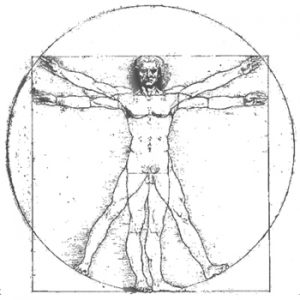 This is the first post in a series questioning general relationship between digital humanities and the sciences. Specifically, the main concern is whether, and to what extent, DH contributes to the scientification of the humanities. That is to say, does DH lead the humanities away from the qualitative and ineffable and toward the quantitative and numerable? Does DH pose new questions as to the study and integrity of the humanities? How might we begin to articulate the potential benefits and limitations of DH when investigating these questions?
This is an ongoing debate between the proponents and critics of DH. The purpose of this series will be to examine the question of the relationship of the human sciences with the natural sciences, and to see how technology and the digitization of knowledge affects that relationship. Such a survey will lead, in part one, to a brief examination of the original distinction between the natural and human sciences, and then, in part two, to the question of technology as applied to human knowledge. Part three will focus on the contemporary relationship between Natural and Human sciences and how DH arises from that relationship.
A series of short blog posts is, of course, inadequate to resolve these big questions with any satisfaction. The purpose of this series is, instead, to raise the questions and begin to search for resources in addressing them. Relevant discussion comes from topics such as hermeneutics and philosophy, but touches on nearly every area of humanistic research. The question is as historical as it is philosophical, and we first have to question how we came to view the natural and human sciences as separate, discrete spheres of knowledge altogether.
This is the first post in a series questioning general relationship between digital humanities and the sciences. Specifically, the main concern is whether, and to what extent, DH contributes to the scientification of the humanities. That is to say, does DH lead the humanities away from the qualitative and ineffable and toward the quantitative and numerable? Does DH pose new questions as to the study and integrity of the humanities? How might we begin to articulate the potential benefits and limitations of DH when investigating these questions?
This is an ongoing debate between the proponents and critics of DH. The purpose of this series will be to examine the question of the relationship of the human sciences with the natural sciences, and to see how technology and the digitization of knowledge affects that relationship. Such a survey will lead, in part one, to a brief examination of the original distinction between the natural and human sciences, and then, in part two, to the question of technology as applied to human knowledge. Part three will focus on the contemporary relationship between Natural and Human sciences and how DH arises from that relationship.
A series of short blog posts is, of course, inadequate to resolve these big questions with any satisfaction. The purpose of this series is, instead, to raise the questions and begin to search for resources in addressing them. Relevant discussion comes from topics such as hermeneutics and philosophy, but touches on nearly every area of humanistic research. The question is as historical as it is philosophical, and we first have to question how we came to view the natural and human sciences as separate, discrete spheres of knowledge altogether.
DH and the Scientification of the Humanities: Introduction
 This is the first post in a series questioning general relationship between digital humanities and the sciences. Specifically, the main concern is whether, and to what extent, DH contributes to the scientification of the humanities. That is to say, does DH lead the humanities away from the qualitative and ineffable and toward the quantitative and numerable? Does DH pose new questions as to the study and integrity of the humanities? How might we begin to articulate the potential benefits and limitations of DH when investigating these questions?
This is an ongoing debate between the proponents and critics of DH. The purpose of this series will be to examine the question of the relationship of the human sciences with the natural sciences, and to see how technology and the digitization of knowledge affects that relationship. Such a survey will lead, in part one, to a brief examination of the original distinction between the natural and human sciences, and then, in part two, to the question of technology as applied to human knowledge. Part three will focus on the contemporary relationship between Natural and Human sciences and how DH arises from that relationship.
A series of short blog posts is, of course, inadequate to resolve these big questions with any satisfaction. The purpose of this series is, instead, to raise the questions and begin to search for resources in addressing them. Relevant discussion comes from topics such as hermeneutics and philosophy, but touches on nearly every area of humanistic research. The question is as historical as it is philosophical, and we first have to question how we came to view the natural and human sciences as separate, discrete spheres of knowledge altogether.
This is the first post in a series questioning general relationship between digital humanities and the sciences. Specifically, the main concern is whether, and to what extent, DH contributes to the scientification of the humanities. That is to say, does DH lead the humanities away from the qualitative and ineffable and toward the quantitative and numerable? Does DH pose new questions as to the study and integrity of the humanities? How might we begin to articulate the potential benefits and limitations of DH when investigating these questions?
This is an ongoing debate between the proponents and critics of DH. The purpose of this series will be to examine the question of the relationship of the human sciences with the natural sciences, and to see how technology and the digitization of knowledge affects that relationship. Such a survey will lead, in part one, to a brief examination of the original distinction between the natural and human sciences, and then, in part two, to the question of technology as applied to human knowledge. Part three will focus on the contemporary relationship between Natural and Human sciences and how DH arises from that relationship.
A series of short blog posts is, of course, inadequate to resolve these big questions with any satisfaction. The purpose of this series is, instead, to raise the questions and begin to search for resources in addressing them. Relevant discussion comes from topics such as hermeneutics and philosophy, but touches on nearly every area of humanistic research. The question is as historical as it is philosophical, and we first have to question how we came to view the natural and human sciences as separate, discrete spheres of knowledge altogether.



Leave a Reply